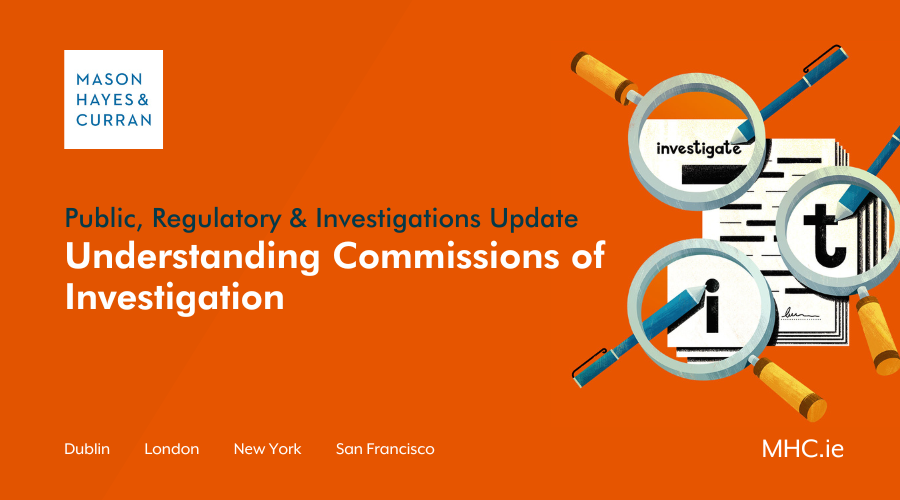
The Government has announced the establishment of a Commission of Investigation (COI) to examine historical sexual abuse in day and boarding schools run by religious orders, following the recommendation in the Scoping Inquiry Report.
COIs are independent statutory inquiries, empowered to investigate matters of significant public concern. They possess robust investigative powers and operate with procedural flexibility to ensure a comprehensive and fair process.
In this article, we provide an overview of how COIs function in practice. In addition, we outline what those involved in COIs can expect from the process.
Key features
The Commissions of Investigation Act 2004 empowers the Government to establish COIs to investigate matters of significant public concern. The key features of COIs include:
Primarily private proceedings
Unlike many other forms of public inquiries, COIs generally operate in private. This confidentiality serves several important purposes:
- Protecting witnesses: It encourages witnesses, particularly those who may be vulnerable, to come forward and share their experiences without fear of public scrutiny
- Ensuring candour: It allows individuals to speak freely and honestly, without concern for reputational damage or legal repercussions
- Safeguarding sensitive information: It protects confidential and personal information that may be revealed during the investigation
While the default setting is privacy, COIs have the flexibility to hold hearings in public when deemed necessary. This might occur when:
- A witness requests a public hearing, and the COI grants this request
- The COI determines that public proceedings would serve the interests of the investigation and fair procedures
COIs also have the discretion to control who may attend hearings.
Extensive investigative powers
COIs are equipped with robust legal powers to fulfil their mandate effectively. These powers include:
- Compelling witness evidence: COIs can compel individuals to appear before them and give evidence under oath
- Requiring document production: COIs can require the production of relevant documents from individuals and organisations
- Searching premises: In certain circumstances, COIs can obtain warrants to search premises and seize relevant documents
- Enforcing compliance: COIs can seek the High Court’s assistance to enforce their directions and compel compliance
Procedural flexibility
COIs enjoy significant procedural flexibility, allowing them to tailor their approach to the specific circumstances of each investigation. This contrasts with the more rigid procedures of tribunals of inquiry or courts. This flexibility enables COIs to:
- Prioritise witness wellbeing: COIs can adopt procedures that minimise stress and potential re-traumatisation for vulnerable witnesses, such as avoiding cross-examination or allowing evidence to be given by video link or recording
- Conduct efficient inquiries: COIs can streamline procedures to ensure a focused and efficient investigation
- Adapt to evolving needs: COIs can adjust their approach as the investigation unfolds, responding to new information or challenges
Timelines and costs
While COIs are generally faster and less expensive than other forms of public inquiry, they still involve a significant commitment of time and resources:
- Typical duration: Most COIs take at least two years, from establishment to publication of their final report
- Cost considerations: The cost of a COI varies depending on its complexity and duration, but it can be substantial
Key stages
Once the Government establishes a COI, a clear process unfolds to ensure a fair and thorough investigation. Here is a breakdown of the key stages:
- Defining the scope (Terms of Reference): The first crucial step is to define the COIs scope through its Terms of Reference. This document outlines the specific issues and questions the COI will investigate, as well as any relevant time frames or limitations. In this case, the Scoping Inquiry Report has proposed potential terms of reference. These can be approved or amended by the Government or an individual Minister.
- Appointing the Commission: Once the terms of reference are finalised, the Government will select and appoint the COI members, including a chairperson.
- Gathering documents (Discovery): The COI will then embark on a comprehensive process of gathering documents. This will involve seeking relevant records from institutions, and individuals.
- Hearing evidence: The COI will hold hearings to gather evidence form witnesses.
- Drafting the Report: Based on the evidence gathered, the COI will then draft its report detailing its findings and recommendations.
- Review and submissions: Before submitting the final report to the Government, the COI must provide a copy to any person identified or identifiable within it. These persons have the opportunity to make submissions, or seek a court order to amend the draft if they believe it is inaccurate or unfair.
- Government action and potential next steps: Upon receiving the COI’s report, the Government will typically publish it. However, if the report could prejudice ongoing criminal proceedings, the Government may seek guidance from the High Court regarding publication. The Government may also decide to establish a tribunal of inquiry to investigate specific matters arising from the COI’s findings. This allows for a more in-depth examination of particular issues that require further scrutiny.
COIs are flexible statutory inquiries with significant powers, and procedures that can be shaped to accommodate the needs of participants. The terms of reference are yet to be set by the Government. However, those involved can expect the proposed commission to investigate broad questions of systemic failings and institutional responsibility, particularly regarding the handling of historical sexual abuse allegations.
Need more information?
Our Public, Regulatory & Investigations team has deep expertise in navigating complex inquiries and assisting organisations participating in inquiries. Please contact us if you would like to discuss the implications of this proposed COI and how we can assist you.
People also ask
What is a Commission of investigation in Ireland? |
A Commission of Investigation is a form of statutory inquiry established under the Commissions of Investigation Act 2004 to investigate a matter of significant public concern. |
What is the difference between a tribunal of inquiry and a commission of investigation? |
Commissions of investigation are generally faster and less expensive than tribunals of inquiry. This is mainly due to the fact that in commissions, unlike tribunals, evidence is given in private. |
Are reports of commissions of investigation published? |
Yes, final reports of commissions of investigation are typically published by the Government. Reports are usually anonymised to protect the identities of those who have given evidence. |
The content of this article is provided for information purposes only and does not constitute legal or other advice.
Share this:





